http://docshop0.tumblr.com/
Notes from El Saniyya Time-lapse from metaLAB(at)Harvard on Vimeo.
http://docshop0.tumblr.com/
Notes from El Saniyya Time-lapse from metaLAB(at)Harvard on Vimeo.
Dear Friends,
Harvard’s DocShop and MIT OpenDocLab Fellow Lara Baladi are happy to invite you to Notes from El Saniyya on Thursday December 11th from 3-9 pm, with the main event and artist’s talk from 6:30-8:00, at the Harvard Graduate School of Design.
Based on a growing archive that artist Lara Baladi has been gathering since the 2011 Egyptian Revolution, Notes from El Saniyya is an invitation to participate in the making of a ‘transmedia painting’ and is part of the interactive history-telling project Baladi is developing at OpenDocLab, called Vox Populi, Archiving a Revolution in the Digital Age.
Tahrir Square was the most digitally documented and disseminated event in modern history. It is the archetype of a global phenomenon that marks the beginning of the 21st century. Baladi’s Vox Populi will act as a tribute to this symbolic event and represent its impact on and resonance with the uprisings and socio-political movements that followed, and continue to do so worldwide.
Notes from El Saniyya is the first in a series that DocShop and artist Lara Baladi will present during the 2014-15 academic year. Experimental and conversational, the event will offer participants the chance to interact with archival media, give feedback, and contribute ideas which will help inform later events in the series. This open lab experience mixing art, history, and digital media will encourage participants to immerse themselves in the creative process of making socially-engaged art.
Notes from El Saniyya will take place on Thursday December 11th, from 3-9 pm in Gund 522 (The HILT room) at the Harvard Graduate School of Design, 48 Quincy St, Cambridge, MA 02138.
Space for this event is limited, please RSVP here: http://goo.gl/forms/IzopK1UwWL
Email Joe Steele jsteele@gsd.harvard.edu with any questions.
Warmly,
DocShop and Lara Baladi
DocShop is an interactive documentary workshop that seeks to engage filmmakers, artists, and storytellers with new audiences. Dedicated to exploring the possibilities of embodied media in ever-expanding contexts of participation, DocShop is part of the Digital Problem Solving Initiative (DPSI) at the Berkman Center for Internet and Society and metaLAB at Harvard.
Lara Baladi is an internationally recognized multi-disciplinary Egyptian artist. Baladi applies archives, investigations of myths, and personal narratives to a range of mediums including architectural and video installations. Baladi publishes and exhibits worldwide. Here is a link to her CreativeTime Reports articles. Her works are part of a number of institutional and private collections. She has been a board member of the Arab Image Foundation since its creation in 1997 and in 2014, began to serve on the advisory board of R-Shief, a historical online archive and media system.
During the 2011 Egyptian uprising, Baladi co-founded two media initiatives, Radio Tahrir and Tahrir Cinema, which served as public platforms to build and share an archive on and for the revolution. Today, much of Baladi’s work revolves around and stems from this archive.
What we worked on This week we met in Gund 522 to start figuring out the exact ‘stations’ that will be part of the spatialization of Lara’s Tahrir Square archive. We also talked about various data visualizations and tools (such as Gephi, Roundware, and BackStory) we will utilize in the buildout of this prototype for DocShop’s pilot event. We have one or two venues we are deciding between and we are looking at the evening of Thursday December 11th as a launch date. Here are some process documents/photos from today: 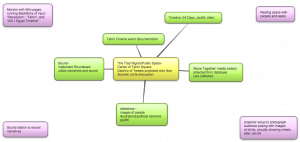
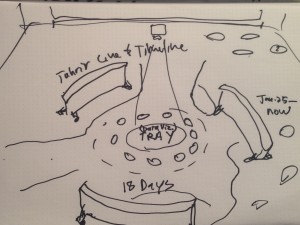
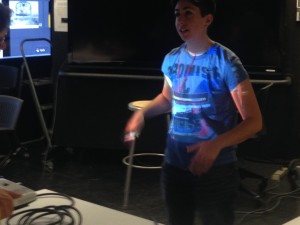
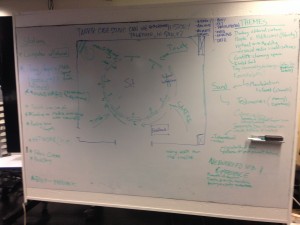
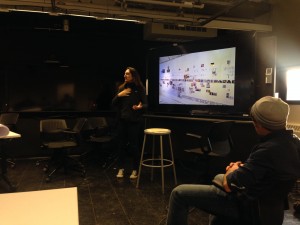
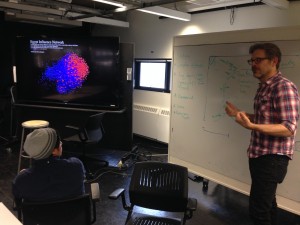
What went well
Dividing aspects of the archive into different ‘stations’ and dividing up tasks and ownership. The tasks include PR and outreach, media, event planning, physical layout, printing, and documentation.
What was challenging
Narrowing down the scale of this project to something attainable within two weeks while being faithful to the ideal form this embodiment of the archive will take.
What’s up next
We will meet twice in the week following Thanksgiving. Once in Gund 522 for a working meeting, and once in the space where we will be projecting/performing the archive to start blocking out the stations and media in real space.
What we worked on
This week, we met with Lara Baladi, (OpenDocLab Fellow) to start making a plan for how to frame the different stations of her spatialization of her timeline and archive. The goal of DocShop’s project is to help artists realize how to animate an archive in real space and how to architect experiences that will bring artists and audiences together. Lara expressed her interest in metanarratives and that the archetypal emerges out of the multivalent.
Here is an article on the project that was in Guernica mag. You can also see a three channel buildout from the archive, along with two articles written by Lara on CreativeTimeReports. Lara had also attended the MIT Infinite Record conference and highly recommended we all see that. This is prescient in terms of her practice as this year was focused on archive, memory, and performance.
Additionally, Rachel presented to the group this week a module on interactivity and learning design, along with a project that she made on a class that examined pedagogy design, specifically around constructivist pedagogy. The readings included ‘Designing Interactions’ by Bill Moddridge and Joh Sweller’s writings on Multimedia Learning and Cognitive Load Theory. Her project is called ‘Alright Eros’, which was modeled after OK Cupid, where the user becomes complicit in giving personal information to the program, whether in the form of quizzes or actual sensitive data. At the end, you get an error message and there is a small string of text that says ‘Did you need to give your credit card information?’ Ian Bogost’s Cow Clicker came up as an example of deconstructivist or subversive social games.
What went well
We had a number of ideas to share. The group gave wonderful feedback and issues from our readings came up during discussion of interaction and in talking about Lara’s project. The most effective thing we did was articulate what we (DocShop) wanted to get out of this collaboration. Lara expressed her aims/goals/desires of this process, and each group member individually said why they wanted to do this.
What was challenging
Making sure we get the scope breakdown schedule right, to deliver this prototype by December 11, which is only 3.5 weeks away.
What’s up next
We will meet next week on Sunday in Gund 522 to keep working with the material. Lara, the group, possibly Halsey Burgund (developer of Roundware and OpenDocLab fellow) and the metaLAB team will be there.
What we worked on
We had two meetings this week. During the first DPSI meeting, we responded to last week’s visit to Lawrence to see Dan’s locative media piece ‘Fall of the Pemberton Mill’. We then shifted into project management mode to make a schedule and scope out our first event.
In the second meeting, we met in the HILT Room in Gund 522, where Lara Baladi (Egyptian-Lebanese artist and fellow at the MIT Media Lab) presented her work and posed various problematiques of working with an archive, troubling the idea of the public domain, and how to combine media with data visualization and record narratives from the audience. Lara, along with the group, came up with an idea for a prototype for the first ‘happening’ for #DocShop, which will be in the first week or two of December. More information to come next week.
What went well
It was great to start really digging into the material, with the artist present. We also got to discuss our positioning to the modes of interactivity in documentary arts and storytelling, and what it means to spatialize time-based media.
What was challenging
Planning this event in such a short time and scoping out what we will be able to do by early December. The team is working beautifully, but the challenge comes with working with media in space and planning the event, and the moving parts that go along with it, along with being respectful to the artist’s material.
What’s up next
Booking a space, meeting with Lara at our #DocShop meeting on Friday, and beginning the planning of the installation and event.
After a bit of a lull for the past week as we were sending emails and planning the next stage of our project, I am pleased to say that we are back in action. We are particularly excited for this Friday, when we will be meeting Samantha Earp, Executive Director or HarvardX, to talk about their policies regarding accessibility in their online education platform. I’m particularly interested in seeing how the policies of HarvardX, a private entity in the sphere of online education, differs from the policies and approach set by the Disability Services Office, which is part of Harvard University itself.
More on the outcome of our meeting in our next post!
-Curren
This week we took a field trip out to Lawrence, MA to experience an interactive documentary in situ: The Path: The Fall of Pemberton Mill, produced by #DocShop member Dan Koff.
This multi-modal presentation of 7 videos, played on personal smart phones over the course of a walking tour of the Lawrence mills, featured the narrative of a present-day teenager intertwined with the historical perspective of 2 sisters who had worked in Pemberton Mill disaster, interviews with present-day historians and a relative of the two sisters. Additional media assets included place markers around Lawrence, artifacts such as maps, indentures, and arrest records, as well as the historic mill buildings themselves.
The Path videos augmented reality to create a novel experience of place that was connected to historic events by proximity. The maps and instructions provided in the video series led us gently along while allowing enough room for ad hoc exploration of the spaces and artifacts. There was a consensus in our group that the piece would have worked just as well if we had not had Dan to guide our way, and that the overall experience benefitted from the social context of group discussion.
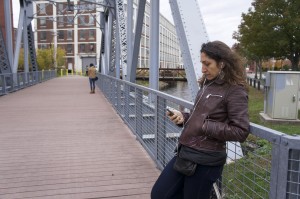 What Was Challenging
What Was Challenging
While the overall experience was quite positive and thought-provoking, some unanswered questions remain. The piece itself was participatory, but we were not sure if it fits the definition of interactive. The spectrum of interactivity continues to be a concept that we hone and refine. We also discussed the possibility of creating a networked learning experience with the incorporation of audience participation; we brainstormed ways that participants might add content in the form of reflections on present-day industrial accidents and generating their own media that connects the present to the past. This could take many different forms and we weren’t sure which would be most effective for the participant, and most interesting for the larger network of the piece’s audience.
What’s Up Next
For the next meeting, we’ll continue to unpack our experience with The Path in a discussion of location-based storytelling and the limits of interactivity, as not all of the #DocShop members were able to join us in Lawrence.
We also plan to recap and reflect on some of the group members’ experience of Ragnar Kjartansson’s The Visitors and the recent Illuminus Festival.
Ultimately, we’ll work on a roadmap for collaborating with Lara Baladi and the final #DocShop deliverable for DPSI.
Midterm review/ What we did
The midterm review was productive in introducing various topics of discussions for our team to move forward with the Open Access project. Through the suggestions of the various groups, the Open Access team is working on the DASH opinions from various Harvard departments, and analyzing the data we are receiving to move forward on a method to best attack the next steps of instating the Open Access project.
What went well
Our team learnt that a possible solution on getting faculty members with published materials to participate within the program is to communicate with their assistants, and work with an online system that enables faculty members to submit their published papers through a departmental electronic system. A similar system is being used at the Berkman Center for fellows and scholars, whereby it is required before an article is submitted for review, that there is an online check-box system for scholars to tick off, and agree to their rights of file to be reviewed and submitted to the DASH system.
Another suggestion was to contact and develop relationships with publishing houses, who would like to cooperate with the DASH system and move forward with donating their published papers within the DASH system. Whereby the open access team could monitor and bring access to the Harvard University community.
What was challenging
The challenge that we foresee is for a 80% or more implementation rate of open access throughout the University level. As most publishing houses would like for their publications to be in closed rights. We are also foreseeing difficulties with faculty members remembering to submit their papers to the DASH system, and/or ensuring their participation within the check-box system.
What’s up next
Several members of the open access team are still in the stage of survey within their respective departments, and will be offering other suggestions and comments soon after they receive more feedback.
Updated: 4 November 2014 – Wendy W Fok
Our team was very excited to have participated at the Mid-Term Reviews. Presented by our Team Lead, Wendy W Fok, our Open Access team received many helpful feedback and responses from Prof Chris Bavitz, Prof Jim Waldo, and Prof Urs Grasser.
Most importantly, we would like to announce an exciting approval of the Open Access Policy by Berkman Center:
The Berkman Center announces Open Access Policy
With this policy, approved on October 9, 2014, the Berkman Center’s faculty directors and staff join the action of the nine School faculties: granting the University nonexclusive rights on all new scholarly work relating to the purview of research at the Berkman Center. The policy ensures that the “fruits of [Berkman’s] research and scholarship” will be distributed as widely as possible. (Click here for Read More)
Updated on 29 October, 2014 – Wendy W Fok
Midterm Review Reflections & Updates
What We Did
At the midterm review we presented our main ideas, concerns and roadblocks, as well as a schematic of the app. In addition, we are continuing to work on differentiating ourselves from other competitor apps in the market.
What Went Well
It was great to see that people were reacting positively to the general idea of the app and recognized its importance, especially with the growing momentum behind issues regarding sexual assault.
What was challenging
The concept of bystander intervention is very powerful and a main message of how this app will work. The app won’t be able to fix issues unless people using the app take the initiative and step in. People may struggle with the perceived limited scope of the app, in say a party setting. However, we need to convey to our audience that this app is widely applicable in its usage as a check-in/emergency contact app.
What’s Up Next
Meeting with more student groups, including final clubs and Greek life, and plan out surveys and focus groups to help streamline the functionality of the app. We are working on creating a minimally viable product to display the basic functionality of the app that we have agreed upon and will seek feedback from various members of the Harvard community.